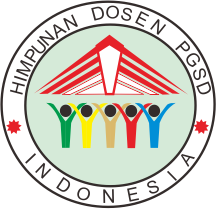MATH GAMES DOMINO EFFECT ON THE RESULTS OF THE LEARNING MATH FRACTIONS IN CLASS IV SD NEGERI 1 KALIKABONG
DOI:
https://doi.org/10.30595/dinamika.v7i2.930Keywords:
domino mathematical, cognitive, affective, psychomotorAbstract
The purpose of this study was to determine: 1) the influence of mathematical domino game against cognitive aspects of mathematics learning outcomes, 2) the influence of mathematical domino game against affective aspects of mathematics learning outcomes 3) the influence of mathematical domino game against psychomotor aspects of mathematics learning outcomes. The research method using experimental research methods to design randomized control group pretest-posttest design. The samples in this study using cluster random sampling. The population in this study is the fourth grade students of SD Negeri 1 and 2 Kalikabong second semester of academic year 2014 / 2015. The experimental classes will be treated mathematics with math domino game material fractions, while grade control using conventional learning. Instruments cognitive aspects of learning outcomes research using test descriptions, research instruments affective aspects of learning outcomes using a questionnaire, and research instruments psychomotor aspects of learning outcomes using performance assessment sheet. Analysis of survey data using statistical analysis independent sample t test with SPSS program. The results showed: 1) a game of dominoes mathematical better effect on the results of the cognitive aspects of learning mathematics, 2) math domino game better effect on the results of the affective aspects of learning mathematics 3) math domino game better effect on psychomotor aspects of mathematics learning outcomes.References
Depdiknas. (2009). Pedoman Pembelajaran Matematika Sekolah Dasar. Jakarta: Depdiknas
Heruman. (2007). Model Pembelajaran Matematika. Bandung: PT Remaja Rosdakarya.
Sudjana, N. (2013). Penilaian Hasil Proses Belajar Mengajar. Bandung: PT Remaja Rosdakarya.
Sugiyono. (2010). Metode Penelitian Pendidikan: Pendekatan Kuantitatif, Kualitatif, dan R&D. Bandung: Alfabeta.
Sundayana, R. (2013). Media Pembelajaran Matematika: Untuk guru, calon guru, orang tua, dan para pecinta matematika. Bandung: Alfabeta.
Susanto, A. (2013). Teori Belajar dan Pembelajaran di Sekolah Dasar. Jakarta: Kencana Predana Media Group.
Suprijono, A. (2013). Cooperatif Learning: Teori dan Aplikasi PAIKEM. Yogyakarta: Pustaka Pelajar
Downloads
How to Cite
Issue
Section
License
Authors who publish with this journal agree to the following terms:
Authors retain copyright and grant the journal right of first publication with the work simultaneously licensed under a Creative Commons Attribution License that allows others to share the work with an acknowledgement of the work's authorship and initial publication in this journal.
Authors are able to enter into separate, additional contractual arrangements for the non-exclusive distribution of the journal's published version of the work (e.g., post it to an institutional repository or publish it in a book), with an acknowledgement of its initial publication in this journal.
Authors are permitted and encouraged to post their work online (e.g., in institutional repositories or on their website) prior to and during the submission process, as it can lead to productive exchanges, as well as earlier and greater citation of published work (See The Effect of Open Access).

Dinamika Jurnal Ilmiah Pendidikan Dasar is licensed under a Creative Commons Attribution 4.0 International License.













